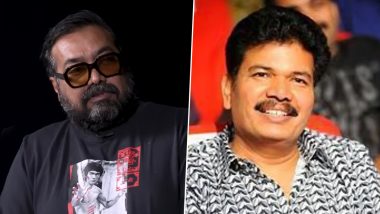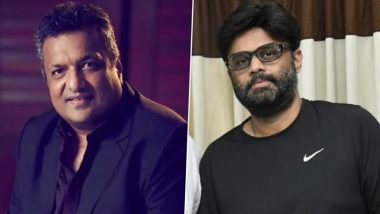Actress Kangana Ranaut, who is in the news for all the wrong reasons these days, received a lot of flak for her tweets on caste discrimination and reservation. Responding to a Twitter user who was referring to Isabel Wilkerson’s controversial book Caste: The Origins of Our Discontents, Kangana tweeted that she believes caste system has been rejected in this country and then blamed the Constitution for persisting with the reservation system. Kangana Ranaut Joins Twitter; Queen Actress Reveals Power of Social Media in SSR Case Made Her to Do So.
She wrote, "Cast system has been rejected by modern Indians, in small towns every one knows it’s not acceptable anymore by law and order its nothing more than a sadistic pleasure for few, only our constitution is holding on to it in terms of reservations, Let Go Of It, Lets Talk About It." (sic).
She then added, "Especially in professions like Doctors engineers, pilots most deserving people suffer reservations, we as a nation suffer mediocrity and brilliance finds a reluctant escape to The United States.. Shame."
Kangana may have tried to make a reasonable debate out of reservation system (in her own head, at least), but it doesn't help when she later dragged her own 'Kshatriya' caste in the debate later and got called out for it.
A woman who defends caste system, takes pride in her caste privilege is not a feminist! Period. #Boycott_Kangana pic.twitter.com/JkbbDFLEn2
— Damni Kain (@DamniKain) August 24, 2020
Looking back at Kangana's tweets on caste and reservation, how right is she in saying that caste system has been rejected?
The many news articles of Dalits and people of scheduled castes and tribes being lynched or killed by upper caste community say otherwise. An open letter in The Wire written to Kangana gives a more intrinsic look at how lower castes are still being treated in this country. And it feels really embarrassing to write about this, when we have gone beyond the second decade of the 21st century.
Reservation may not be right, as it doesn't rely on optimisation on talent and denies many deserving candidates their choice of fields that they could have gotten based on merit. But reservation can only be abolished if discrimination is wiped out of the country altogether. Till that happens, we have to live with this necessary problem.
Kangana could have got a better opinion of how deeply trenched the caste bias is, in her own industry - Bollywood. Beyond the Kumars, Khans and Kapoors, can she list down the Dalit stars who have made it to the top tier of Bollywood strata? She might be shocked to learn the slim findings, if she ever researched on that. Fact Check: Kangana Ranaut Shares Fake Interview of Aamir Khan About Islam and His Kids.
At one point of her Twitter debate, Kangana even compared 'reservation' to 'nepotism'.
FYI, 'Reservation' is a tool to bring a sense of equality in the system. 'Nepotism' is about privilege. Both are vastly different as Kangana's onscreen and offscreen images.
Not sure if she knows it though, but, Kangana has a rare distinction of being one of the few top Bollywood stars to have romanced a Dalit star on the big screen.
In 2011, she acted in a film called Miley Naa Miley Hum, that very few remembers much. The romantic comedy flopped at the box office and was not received well by the critics either. But Miley Naa Miley Hum was special for one reason. It had a Dalit star as the main lead.
Watch the Trailer of Miley Naa Miley Hum:
Chirag Paswan, the son of Union Minister Ram Vilas Paswan, is himself a politician and the president of Lok Janshakti Party. But before he entered politics, Chirag had harboured Bollywood aspirations and had made his debut with Miley Naa Miley Hum. He belongs to the Dalit caste, which makes his Bollywood debut path-breaking in a way, being the rare example headlining a mainstream Hindi film.
Unfortunately for him, the failure of Miley Naa Miley Hum cut short Chirag's Bollywood innings and he sought to follow his father's steps into politics.
It is not that Bollywood has been devoid of actors belonging to Dalit or other SC categories. We have some really wonderful artistes like Bhagwan Dada, Tuntun, Johnny Lever, composer Ram Laxman, Omkar Das Manikpuri who are some prime examples of Dalit actors breaking the shackles to enter Bollywood. The late Divya Bharati, who was reigning at top in the early '90s before a cruel accident cut her life short, reportedly belonged to the Chamar community. Tamil superstar Dhanush, who made a big Bollywood debut with Raanjhanaa opposite Sonam Kapoor, also belongs to OBC category.
It's difficult to recognise the caste, as the actors and artistes chose to disguise them with changed names or surnames. On the face of it, that may look progressive, as it shows that you don't need to flaunt your caste everytime. A look closer into the hierarchy gives a different idea altogether.
It's easier to perceive that when you see the films themselves. Nearly all the mainstream films have their protagonists belonging to the upper-caste categories. Most of the heroes are nearly Savarnas. Just look at how Dhadak, Karan Johar's remake of the Marathi film Sairat, got rid of the caste discrimination themes to make it more of a class-biased love story. When the industry has issues even mentioning the caste, you know there is a problem.
The few times top stars played out characters belonging to OBC categories are when the film is about caste discrimination. Like for example, Nawazuddin Siddiqui and Radhika Apte in Manjhi. Saif Ali Khan in Aarakshan. Or Ajay Devgn in Aakrosh. One big flaw in Anubhav Sinha's brilliant Article 15 that tackles caste discrimination and atrocities against minorities is that it needed a Savarna hero in Ayushmann Khurrana's Ayan Ranjan to champion the cause.
Offbeat cinema are more inclusive with Aakrosh, Paar, Masaan being fine examples of the same. You can also say the same about regional cinema like Tamil, Marathi, Kannada or Malayalam industries, at least in comparison, when it comes to representation from the minority category.
I agree with some of the views out there that we should not bring caste in discussions and look purely at artistes based on their merits. But when your films itself can't help get rid of the caste shackles, relying way too much on having upper-caste protagonists as heroes, this discussion will keep on happening.
Maybe, that's a cause that Kangana should take up in changing her industry than the ones she is harping on these days. If we cheer Hollywood when it talks of #BlackLivesMatter and more inclusivity of other ethnic races, why not been more introspective of our own failings?
(The opinions expressed in the above article are of the author and do not reflect the stand or position of LatestLY.)
(The above story first appeared on LatestLY on Aug 26, 2020 05:01 PM IST. For more news and updates on politics, world, sports, entertainment and lifestyle, log on to our website latestly.com).













 Quickly
Quickly





















